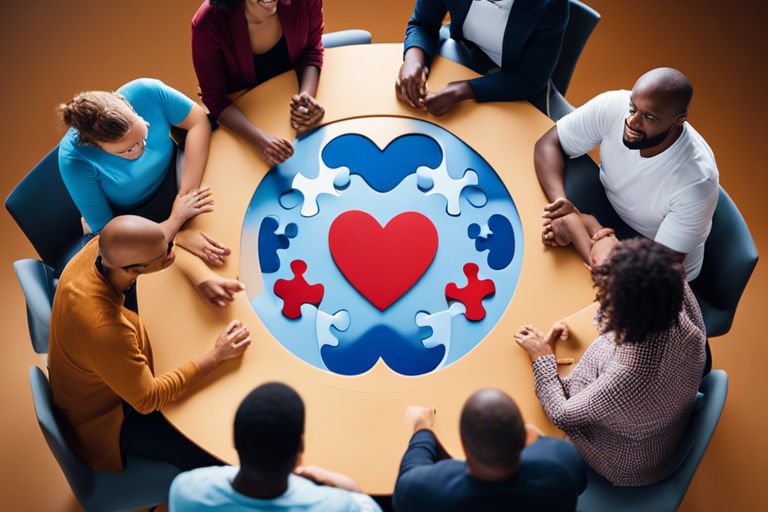Peer support plays a crucial role in enhancing the well-being and quality of life for individuals within autism communities. With 1 in 100 people in the UK being on the autism spectrum, the need for understanding and support is more important than ever. Peer support offers individuals with autism the opportunity to connect with others who share similar experiences, challenges, and triumphs, fostering a sense of belonging and acceptance. It provides a safe space for individuals to share advice, resources, and coping strategies, helping to navigate the complexities of everyday life. Additionally, peer support empowers individuals with autism to advocate for their rights and needs, leading to increased self-confidence and self-advocacy skills. Overall, peer support is a valuable resource that promotes inclusivity, empowerment, and a sense of community within autism communities.
Key Takeaways:
- Peer support is crucial: Peer support provides individuals with autism a sense of belonging, understanding, and mutual support within their community.
- Promotes social interaction: Engaging in peer support activities helps individuals with autism develop social skills, communication abilities, and build lasting friendships.
- Encourages empowerment: By sharing experiences, knowledge, and advice, peer support empowers individuals with autism to advocate for themselves, access resources, and navigate challenges effectively.
Understanding Autism
As we research into the complexities of autism, it is crucial to first grasp the fundamental aspects that define this neurodevelopmental condition. By understanding autism, we can better appreciate the nuances of peer support within autism communities and the significance it holds for individuals on the spectrum.
Defining Autism Spectrum Disorder
Autism Spectrum Disorder (ASD) is a complex developmental condition that typically appears during early childhood, affecting social interaction, communication skills, and behaviour. Individuals with ASD may exhibit a wide range of strengths and challenges, making it a spectrum disorder with varying degrees of severity. Key characteristics may include difficulties in social communication, repetitive behaviours, sensory sensitivities, and differences in processing information.
Autism in Different Life Stages
Autism presents unique challenges and opportunities at different life stages, from childhood through adolescence and into adulthood. The way autism manifests can evolve over time, influenced by factors such as education, social experiences, and individual growth. Support needs may vary as individuals navigate the transitions of adolescence, independence, employment, and relationships.
Understanding how autism intersects with various life stages provides valuable insights into the diverse needs and experiences of individuals on the spectrum. By recognising these differences and offering tailored support, communities can foster inclusivity and empower individuals with autism to thrive.
The Importance of Community Support
Community support plays a vital role in the well-being of individuals within the autism community. Peer support can provide a sense of belonging, understanding, and acceptance that is crucial for individuals with autism. Having a community that offers support and resources can greatly enhance the quality of life for those on the autism spectrum.
The Impact of Social Support on Mental Health
Social support within autism communities has a significant impact on mental health. Individuals who receive emotional and practical support from peers are less likely to experience feelings of isolation and anxiety. Connecting with others who share similar experiences can provide a sense of validation and empathy, leading to improved overall mental well-being.
Building Inclusive Autism Communities
Creating inclusive autism communities is essential in providing a safe and supportive environment for individuals on the spectrum. This involves promoting acceptance, understanding, and empathy towards individuals with autism. By fostering a sense of belonging and inclusion, these communities can empower individuals to thrive and reach their full potential.
Organisations and support groups can play a key role in building these inclusive communities by providing educational programmes, advocacy initiatives, and social events that promote acceptance and empowerment among individuals with autism.
Peer Support in the Autism Community
Peer support plays a vital role in the autism community, providing individuals on the autism spectrum with understanding, empathy, and a sense of belonging. This form of support involves connecting individuals with similar experiences, challenges, and strengths, fostering a sense of camaraderie and mutual assistance.
Types of Peer Support Programs
There are various types of peer support programs available for individuals with autism, each catering to specific needs and preferences. These programs can range from online forums and support groups to mentorship initiatives and social skills training sessions. Peer mentors often provide invaluable guidance and support to individuals navigating daily challenges. Social skills workshops offer practical strategies for enhancing interpersonal interactions and relationships. Support groups create safe spaces for sharing experiences and seeking advice from peers who understand firsthand what it’s like to be on the autism spectrum. Parent-led peer support programs also play a crucial role in providing families with information, resources, and emotional support.
- Peer mentors offer guidance and support
- Social skills workshops provide practical strategies
- Support groups offer safe spaces for sharing experiences
- Parent-led programs provide information and emotional support
Recognizing the diverse needs of individuals on the autism spectrum, peer support programs aim to offer tailored assistance and foster a sense of community among participants.
Benefits of Peer Support for Individuals with Autism
Engaging in peer support programs can bring about numerous benefits for individuals with autism. By connecting with peers who share similar experiences, individuals can develop social skills, increase self-confidence, and enhance their sense of belonging within the community. Peer support also reduces feelings of isolation and provides a platform for individuals to share coping strategies and celebrate successes together.
Peer support within the autism community has been shown to improve overall well-being, reduce anxiety levels, and promote self-advocacy and self-acceptance. Individuals who participate in peer support programs often experience a sense of empowerment and find comfort in knowing that they are not alone in their journey.

Challenges and Considerations
Overcoming Stigma and Misconceptions
One of the biggest challenges faced by individuals in autism communities is overcoming stigma and misconceptions. Due to a lack of awareness and understanding, there are often negative stereotypes associated with autism. This can lead to feelings of isolation and discrimination within the community. Peer support plays a crucial role in combatting this stigma by providing a safe space for individuals to share their experiences and educate others about the reality of living with autism.
Through open and honest communication, individuals can challenge misconceptions and break down barriers that hinder acceptance and support. By sharing personal stories and insights, peer support members can educate the wider community on the diverse strengths and challenges faced by individuals on the autism spectrum.
Ensuring Accessibility and Inclusivity in Support Programs
Another important consideration in autism communities is ensuring accessibility and inclusivity in support programs. It is vital that support services are accessible to all individuals regardless of their background, abilities, or resources. Peer support groups should strive to create inclusive environments where everyone feels welcome and valued.
By providing resources and accommodations such as online meetings, captioned videos, or sensory-friendly spaces, support programs can cater to a diverse range of needs within the autism community. Ensuring accessibility not only enhances participation but also empowers individuals to seek and receive the support they require to thrive.

Implementing Effective Peer Support Strategies
Training and Best Practices for Peer Supporters
Training peer supporters is crucial for ensuring effective and meaningful support within autism communities. Providing comprehensive training that covers the intricacies of autism, communication strategies, active listening skills, and conflict resolution is essential. Best practices include emphasising the importance of empathy, respect for individual differences, and maintaining boundaries within the peer support relationship.
Peer supporters should also be encouraged to participate in ongoing professional development to enhance their skills and knowledge. This could involve attending workshops, engaging in peer supervision sessions, and staying up-to-date with the latest research and resources in the field of autism support. By continuously honing their abilities, peer supporters can offer high-quality assistance to individuals within the autism community.
Evaluating the Effectiveness of Peer Support
Assessing the effectiveness of peer support programmes is essential to ensure that they are achieving their intended goals. This can be done through outcome evaluation measures, such as tracking changes in participants’ self-confidence, social connections, and overall well-being. Additionally, process evaluation can help identify strengths and areas for improvement in the delivery of peer support services.
By regularly evaluating the impact of peer support initiatives, organisations can make informed decisions about resource allocation, programme development, and staff training. This continuous feedback loop is essential for fostering a culture of learning and improvement within autism communities.
Furthermore, employing a participatory approach involving feedback from both peer supporters and recipients of support can provide valuable insights into the effectiveness of peer support strategies. This collaborative evaluation process can lead to more tailored and impactful support services for individuals on the autism spectrum.

The Role of Peer Support in Autism Communities
Peer support plays a vital role in autism communities by providing individuals with a sense of belonging, understanding, and acceptance. Through shared experiences and perspectives, peers can offer valuable emotional support, practical guidance, and social connections that can help improve the well-being and quality of life for those with autism. By fostering a supportive environment where individuals can feel validated and empowered, peer support contributes to building a stronger and more inclusive community for people on the autism spectrum. It is crucial to recognise the significance of peer support and continue to advocate for its integration into autism services and programmes to ensure that individuals with autism have access to the valuable support they need.
FAQ
Q: What is peer support in autism communities?
A: Peer support in autism communities involves individuals with autism coming together to share experiences, advice, and emotional support with one another.
Q: How does peer support benefit individuals with autism?
A: Peer support provides individuals with autism a sense of belonging, understanding, and acceptance from others who share similar experiences and challenges.
Q: Is peer support effective in addressing the social needs of individuals with autism?
A: Yes, peer support plays a crucial role in addressing the social needs of individuals with autism by promoting social skills development, communication, and relationships.
Q: What are some common activities in peer support groups for autism communities?
A: Common activities in peer support groups for autism communities include group discussions, sharing personal experiences, participating in social events, and engaging in sensory-friendly activities.
Q: How can one participate in peer support groups for autism communities?
A: To participate in peer support groups for autism communities, individuals can join local autism organisations, online forums, social media groups, or attend support group meetings in their area.
Q: Are peer support groups inclusive of all individuals with autism?
A: Yes, peer support groups strive to be inclusive of all individuals with autism regardless of age, gender, background, or level of functioning, creating a welcoming and safe environment for everyone.
Q: What role do peer support leaders play in autism communities?
A: Peer support leaders in autism communities facilitate group activities, provide guidance, resources, and emotional support, and ensure that all members feel valued, respected, and heard.







